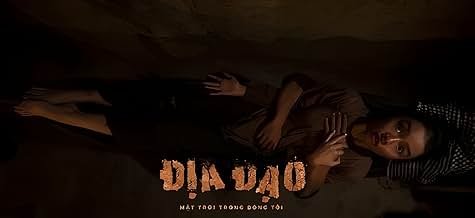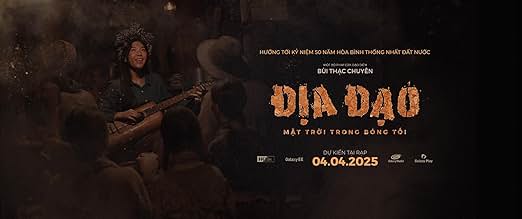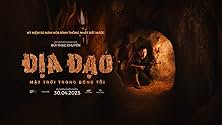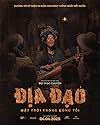Agrega una trama en tu idiomaIn 1967, as the Vietnam War raged, a Vietnamese revolutionary guerrilla team became the U.S. military's top target - charged with safeguarding a secret group of intelligence agents at all co... Leer todoIn 1967, as the Vietnam War raged, a Vietnamese revolutionary guerrilla team became the U.S. military's top target - charged with safeguarding a secret group of intelligence agents at all costs.In 1967, as the Vietnam War raged, a Vietnamese revolutionary guerrilla team became the U.S. military's top target - charged with safeguarding a secret group of intelligence agents at all costs.
- Dirección
- Guionista
- Elenco
- Dirección
- Guionista
- Todo el elenco y el equipo
- Producción, taquilla y más en IMDbPro
Opiniones destacadas
The movie follows a scrappy 21-person Vietnamese guerrilla squad that ends up in the crosshairs of a US forces search and destroy mission. Their task is to protect a newly arrived strategic intelligence team hiding at their base, no matter what it takes. The plot isn't overly complex, so the film hooks you more with the characters' inner struggles than with battlefield tactics.
I really liked how the story kicks off with a lost soldier stumbling into the guerrilla team's tunnel network. It sparks some funny and engaging moments that flesh out the bonds between the Vietnamese soldiers. But as the film hits its midpoint, the escalating tension of the war with the US army starts to drown out those emotional connections. I get why it shifts that way, but it's a pity the soldiers' sacrifices didn't land with more weight. It would've hit harder if the director had ramped up the emotional stakes, especially when the guerrilla leader, a key figure, meets his end. That moment deserved a bigger payoff.
There's a touch of sex in the film too nothing overdone, and it feels grounded. I think it's a realistic nod to something rarely explored in stories about Vietnam War soldiers. After all, these are young guys in their prime, still human despite the chaos.
The sound design really stands out. The director nails the raw punch of bombs and gunfire. Visually, it's strong too smart camera angles and solid framing. That's a huge plus in making the film feel real as it brings history to life.
I really liked how the story kicks off with a lost soldier stumbling into the guerrilla team's tunnel network. It sparks some funny and engaging moments that flesh out the bonds between the Vietnamese soldiers. But as the film hits its midpoint, the escalating tension of the war with the US army starts to drown out those emotional connections. I get why it shifts that way, but it's a pity the soldiers' sacrifices didn't land with more weight. It would've hit harder if the director had ramped up the emotional stakes, especially when the guerrilla leader, a key figure, meets his end. That moment deserved a bigger payoff.
There's a touch of sex in the film too nothing overdone, and it feels grounded. I think it's a realistic nod to something rarely explored in stories about Vietnam War soldiers. After all, these are young guys in their prime, still human despite the chaos.
The sound design really stands out. The director nails the raw punch of bombs and gunfire. Visually, it's strong too smart camera angles and solid framing. That's a huge plus in making the film feel real as it brings history to life.
10DKQ-0
Watching The Underground Passage by director Bui Thac Chuyen stirs a deep and powerful wave of emotions-intense, haunting, and profoundly moving. The film is not merely a cinematic experience; it's an emotional journey that draws the viewer into a hidden current beneath the surface, guiding them through shadowy frames filled with tension and quiet despair.
Emotions rise as we witness the resilience and unyielding spirit of people pushed to the very edge. There are moments that tighten the chest-acts of sacrifice, loneliness, and fleeting glimpses of love and hope glimmering in the darkness. Every sound, every ray of light piercing through the cracks in the earth feels like it touches something raw within, evoking deep reflections on war, humanity, and memory.
The Underground Passage doesn't scream-it whispers, but its echoes linger long after the credits roll. The feelings it stirs remain: a quiet ache, a mixture of pride and sorrow, and a profound reminder of what must not be forgotten.
Emotions rise as we witness the resilience and unyielding spirit of people pushed to the very edge. There are moments that tighten the chest-acts of sacrifice, loneliness, and fleeting glimpses of love and hope glimmering in the darkness. Every sound, every ray of light piercing through the cracks in the earth feels like it touches something raw within, evoking deep reflections on war, humanity, and memory.
The Underground Passage doesn't scream-it whispers, but its echoes linger long after the credits roll. The feelings it stirs remain: a quiet ache, a mixture of pride and sorrow, and a profound reminder of what must not be forgotten.
A short and succinct summary of one of many battles conducted during the VN war. Dark and realistic, director Chuyen takes artistic liberties yet still fully immerse audience in VN in the 1900s. The cast was a fresh and enthusiastic ensemble which brought a much needed breath of fresh air to the acting quality. The story, although rough around the edges, paints a lovely picture of the patriotism and humanity of the characters (more like children) involved in the preservation of indepence. The ending was artisticly beautiful, albeit I believe it leaves audience with more emotions than actual answers, conclusive endings to the stories told.
Tunnel: Sun in the Dark is a Vietnamese historical war drama that plunges audiences into the heart of the Vietnam War's most turbulent years. Directed by Bui Thac Chuyen, this film is both a personal and national tribute-a vivid re-creation of the life and sacrifice of the guerrilla fighters who once hid in the labyrinthine tunnels of Cu Chi during 1967.
A Glimpse Into History Set against the backdrop of the Vietnam War's deadliest phase, the film follows a small but resolute guerrilla unit of 21 fighters. Under the steady command of Bay Theo (portrayed by Thai Hoa), the group is tasked with protecting a covert strategic intelligence team from the relentless assault of American forces. The narrative, drawn from real historical events, captures the stark realities of combat and the unsung heroism of soldiers fighting not for glory but for survival and the future of their nation.
Storytelling and Direction Bui Thac Chuyen's directorial approach is both innovative and rooted in authenticity. Instead of opting for a linear, conventional war story, he employs interwoven narratives that mirror the chaotic and fragmented nature of wartime existence. This technique not only maintains a constant sense of tension and mystery but also forces viewers to actively engage with the unfolding events-much like the soldiers themselves, who had to piece together survival strategies under dire circumstances.
The film deliberately eschews overt, bombastic heroism. Instead, it emphasizes the day-to-day struggles, the bittersweet moments of camaraderie, and the subtle, raw expressions of human vulnerability. In doing so, the director transforms the tunnel itself into a character-a silent witness to the myriad sacrifices and quiet acts of defiance that defined this chapter in Vietnam's history.
Production Design and Cinematography One of the film's standout achievements is its meticulous production design. To accurately recreate the claustrophobic and dangerous environment of the Cu Chi tunnels, the production team built a 250-meter-long tunnel model, capturing the oppressive darkness and narrow passageways that the real-life guerrilla fighters navigated daily. The cinematography further amplifies this sense of entrapment and urgency. With skillful use of light and shadow, the camera work draws viewers into the subterranean world where every footstep carries the weight of uncertainty and impending danger.
Stellar Performances The film's cast delivers remarkably authentic performances that elevate the entire production. Thai Hoa, reprising his role as Bay Theo, imbues the character with a palpable sense of duty and internal conflict. His portrayal is both commanding and deeply human, reflecting the heavy burdens of leadership amidst chaos.
Quang Tuan's dedication to his role as Tu Dap is evident-his physical transformation, achieved through rigorous weight loss and intense physical training, underscores the extremes to which the actors went to mirror the hardships of the era. Meanwhile, Ho Thu Anh and Diem Hang Lamoon bring emotional depth and nuance to their respective characters, capturing the delicate balance between fierce determination and personal vulnerability. Their performances add layers to the narrative, making the film's portrayal of war not just about physical battles, but about the internal battles of hope, love, and loss.
Themes and Emotional Impact At its core, Tunnel: Sun in the Dark is more than a war film-it's a meditation on sacrifice, resilience, and the price of freedom. The film's stark realism forces audiences to confront the brutality of war: the constant fear, the physical and emotional toll, and the profound sense of isolation experienced by those who fight from the shadows. Yet, amidst this darkness, the film also reveals moments of tender humanity-brief flashes of laughter, quiet gestures of solidarity, and even the fragile stirrings of romance. These interludes serve as poignant reminders that even in the bleakest of times, the human spirit continues to seek connection and meaning.
Conclusion Tunnel: Sun in the Dark stands out as a significant achievement in Vietnamese cinema. With its painstaking attention to historical detail, innovative narrative structure, and deeply affecting performances, the film offers a window into a past marked by sacrifice and unwavering resolve. It challenges the audience to reflect on the true cost of freedom and the enduring legacy of those who fought-not for fame or fortune, but for the very soul of their nation.
For anyone interested in a film that is as intellectually engaging as it is emotionally stirring, Tunnel: Sun in the Dark is a must-watch. It is a cinematic journey that not only redefines the war genre but also reaffirms the indomitable spirit of Vietnam's people.
A Glimpse Into History Set against the backdrop of the Vietnam War's deadliest phase, the film follows a small but resolute guerrilla unit of 21 fighters. Under the steady command of Bay Theo (portrayed by Thai Hoa), the group is tasked with protecting a covert strategic intelligence team from the relentless assault of American forces. The narrative, drawn from real historical events, captures the stark realities of combat and the unsung heroism of soldiers fighting not for glory but for survival and the future of their nation.
Storytelling and Direction Bui Thac Chuyen's directorial approach is both innovative and rooted in authenticity. Instead of opting for a linear, conventional war story, he employs interwoven narratives that mirror the chaotic and fragmented nature of wartime existence. This technique not only maintains a constant sense of tension and mystery but also forces viewers to actively engage with the unfolding events-much like the soldiers themselves, who had to piece together survival strategies under dire circumstances.
The film deliberately eschews overt, bombastic heroism. Instead, it emphasizes the day-to-day struggles, the bittersweet moments of camaraderie, and the subtle, raw expressions of human vulnerability. In doing so, the director transforms the tunnel itself into a character-a silent witness to the myriad sacrifices and quiet acts of defiance that defined this chapter in Vietnam's history.
Production Design and Cinematography One of the film's standout achievements is its meticulous production design. To accurately recreate the claustrophobic and dangerous environment of the Cu Chi tunnels, the production team built a 250-meter-long tunnel model, capturing the oppressive darkness and narrow passageways that the real-life guerrilla fighters navigated daily. The cinematography further amplifies this sense of entrapment and urgency. With skillful use of light and shadow, the camera work draws viewers into the subterranean world where every footstep carries the weight of uncertainty and impending danger.
Stellar Performances The film's cast delivers remarkably authentic performances that elevate the entire production. Thai Hoa, reprising his role as Bay Theo, imbues the character with a palpable sense of duty and internal conflict. His portrayal is both commanding and deeply human, reflecting the heavy burdens of leadership amidst chaos.
Quang Tuan's dedication to his role as Tu Dap is evident-his physical transformation, achieved through rigorous weight loss and intense physical training, underscores the extremes to which the actors went to mirror the hardships of the era. Meanwhile, Ho Thu Anh and Diem Hang Lamoon bring emotional depth and nuance to their respective characters, capturing the delicate balance between fierce determination and personal vulnerability. Their performances add layers to the narrative, making the film's portrayal of war not just about physical battles, but about the internal battles of hope, love, and loss.
Themes and Emotional Impact At its core, Tunnel: Sun in the Dark is more than a war film-it's a meditation on sacrifice, resilience, and the price of freedom. The film's stark realism forces audiences to confront the brutality of war: the constant fear, the physical and emotional toll, and the profound sense of isolation experienced by those who fight from the shadows. Yet, amidst this darkness, the film also reveals moments of tender humanity-brief flashes of laughter, quiet gestures of solidarity, and even the fragile stirrings of romance. These interludes serve as poignant reminders that even in the bleakest of times, the human spirit continues to seek connection and meaning.
Conclusion Tunnel: Sun in the Dark stands out as a significant achievement in Vietnamese cinema. With its painstaking attention to historical detail, innovative narrative structure, and deeply affecting performances, the film offers a window into a past marked by sacrifice and unwavering resolve. It challenges the audience to reflect on the true cost of freedom and the enduring legacy of those who fought-not for fame or fortune, but for the very soul of their nation.
For anyone interested in a film that is as intellectually engaging as it is emotionally stirring, Tunnel: Sun in the Dark is a must-watch. It is a cinematic journey that not only redefines the war genre but also reaffirms the indomitable spirit of Vietnam's people.
Politically, the film echoes the tone of past propaganda cinema-drawing a clear, almost cartoonish line between the heroic, morally flawless Vietnamese fighters and the evil, inhuman enemy. Such reductionist storytelling undermines the very complexity of history, turning real human suffering into scripted spectacle. Modern audiences, especially younger generations who have grown up with access to global perspectives, no longer respond to one-sided narratives. They seek stories with depth, vulnerability, and moral ambiguity-something dia dao completely lacks.
More importantly, the film weaponizes patriotism in a heavy-handed way. Rather than trusting viewers to feel national pride through authentic, human storytelling, it forces them into admiration with loud speeches, dramatic music, and hollow symbols. In doing so, it disrespects the intelligence of its audience and, paradoxically, cheapens the very ideals it sets out to honor.
More importantly, the film weaponizes patriotism in a heavy-handed way. Rather than trusting viewers to feel national pride through authentic, human storytelling, it forces them into admiration with loud speeches, dramatic music, and hollow symbols. In doing so, it disrespects the intelligence of its audience and, paradoxically, cheapens the very ideals it sets out to honor.
¿Sabías que…?
- Versiones alternativasAn alternate version, titled the Director's Cut, was released on April 30, 2025. This cut is 3 minutes shorter than the original theatrical version.
Selecciones populares
Inicia sesión para calificar y agrega a la lista de videos para obtener recomendaciones personalizadas
Detalles
Taquilla
- Presupuesto
- USD 2,240,000 (estimado)
- Total a nivel mundial
- USD 6,641,870
- Tiempo de ejecución2 horas 8 minutos
- Color
- Mezcla de sonido
- Relación de aspecto
- 2.76 : 1
Contribuir a esta página
Sugiere una edición o agrega el contenido que falta

Principales brechas de datos
By what name was Tunnel (2025) officially released in India in English?
Responda
















